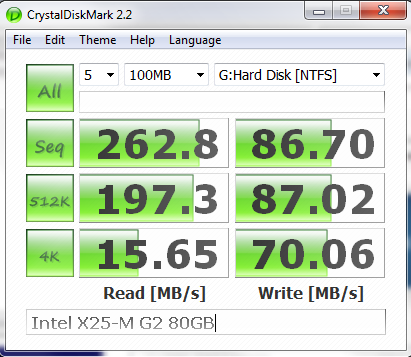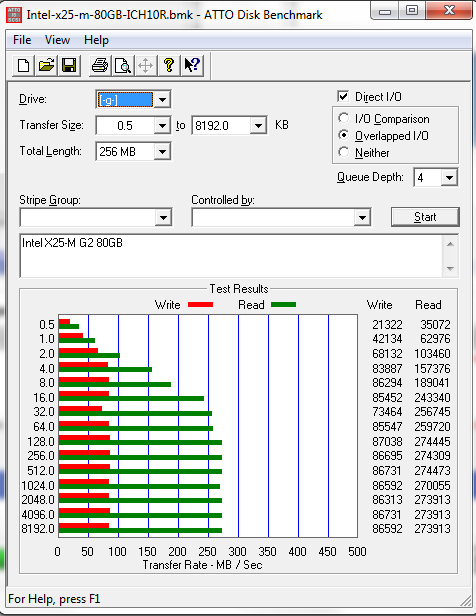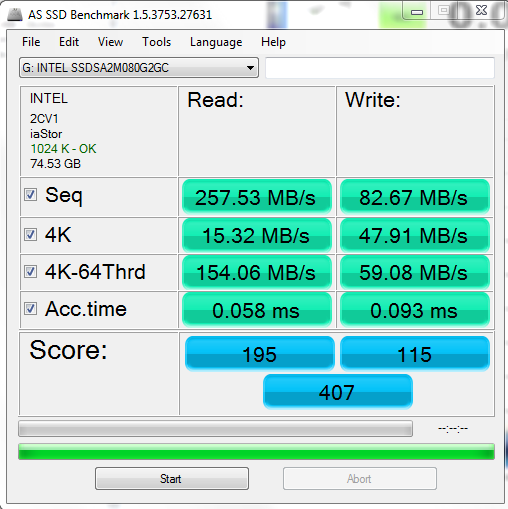Although Intel will be releasing the X25-M G3 SSDs in the next few months, I get asked frequently to provide some X25-M G2 numbers for comparison with the other SSD benchmarks on this site. As I am currently working on a new NAS testbed, I had two Intel X25-M G2 80GB‘s that got freed up and I am able to provide some numbers.
Test Configuration
For the test configuration I used the same setup as I have been using for my SSD reviews:
- CPU: Intel Core i7 920
- Motherboard: Gigabyte X58-Extreme
- Memory: 12GB of Corsair Dominator GT 1600 C7 DDR3
- Case: CoolerMaster Cosmos S
- Drives (OS): 2x OCZ Vertex 120GB in RAID 0
- SSDs: OCZ Agility 2 120GB and ADATA S599 64GB
- SSDs: Intel X25-M G2 80GB
- Controller: Intel ICH10R with Intel Rapid Storage Technology (RST) 9.6.0.1014
- NIC (additional): Intel Pro/1000 PT Quad
- Host OS: Microsoft Windows 7 Ultimate 64-bit
I will again note that the numbers I find in my testing may not be indicative of what one may see on an AMD or NVIDIA chipset. In fact, I tried installing the drive on a default ICH10R and Windows 7 x64 Pro installation using all default drivers and saw significantly lower performance. Furthermore, I tried an eSATA port on my laptop an again saw poor performance. If installing any SSD, I would strongly suggest installing the newest Intel RST drivers and making sure the SATA controller is set to AHCI or RAID mode.
Intel X25-M G2 80GB Benchmarks
On to the benchmarks! I am using my revised standard benchmark suite to make it easy to compare to other SSD reviews I have posted.
CrystalDiskMark
I have used CrystalDiskMark (and an older one at that at version 2.2) for quite a while now, and so I am providing these results as a point of reference.

Here one can see both the strengths of the Intel X25-M G2 controller compared to the Sandforce SF-1222 controller, as well as a few weaknesses. Compared to the 64GB ADATA S599, the X25-M G2 shows higher sequential read speeds (due to the less compressible data in CDM) and lower sequential write speeds. On the 4K side slower reads than the Sandforce drives but faster 4K reads.
ATTO Benchmark
ATTO has been one of my longstanding favorite benchmarks as it usually gives a different view of drive performance than a lot of the other quick benchmarks available. It writes highly compressible data so it is a “best-case” benchmark at this point. Sandforce drive makers like to tout ATTO scores but they are not really representative of real-world performance for most people.

While the read speeds are very competitive with the Sandforce drives like the OCZ Agility 2 and ADATA S599, the write speeds leave a bit to be desired. The nice thing is that the X25-m G2 drives, like Indilinx based drives, actually see these read/ write speeds for compressed data also.
AS ASSD Benchmark
The AS ASSD Benchmark was developed specifically to test SSDs. This is a new benchmark to my suite that I started to use in the Intel X25-V 40GB RAID 0 benchmarks and used again with the OCZ Agility 2 and ADATA S599 benchmarks.

One can see solid performance and somewhat better than the Sandforce drives. The standout here is the access times which are much lower than what Sandforce offers.
Conclusion
The current generation SSDs are experiencing significant price drops as 25nm NAND production ramps up. This makes SSDs more accessible for many users. The Intel X25-M G2 controller is actually a very strong fit for ZFS L2ARC applications as the cache level is generally filled relatively slowly to minimize the write cycles on SSDs. 70-80MB/s is easily enough for most L2ARC applications. As a boot drive, I can say that a single or dual Indilinx drive like the Vertex 120GBs I use in the testbed, a single or dual Sandforce drive, single or dual X25-V 40GBs or X25-M G2’s one will likely not notice a perceptible speed difference. A second or two booting may be a difference, but each controller design has strengths and weaknesses. With the X25-M’s recently receiving a price drop, the 80GB drives are once again priced in-line with competition providing users that prefer Intel drives a price competitive choice.




I’ve been using it for many months now and I love it. It’s very hard to go back to a computer with a HDD.
I wonder though, why the slow write speeds…
It is an Intel G2 controller design. If you look at the ATTO write speeds of the X25-M 80GB G2 they are almost exactly that of two X25-V’s in RAID 0 and slightly slower than the 160GB variant.